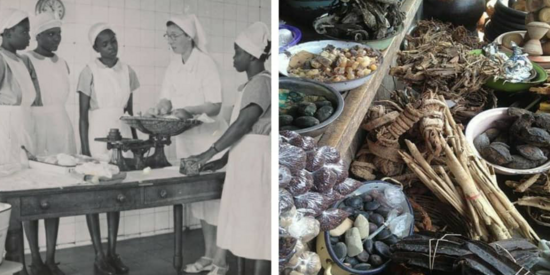
Tolulope Esther FadeyiEngendering the Colony: Maternal Health, Indigenous Knowledge and European Medicine in Southwest Nigeria, 1925-1960
The significance of women and mothers in Yoruba society cannot be overemphasized. Iyaniwura, Baba nijigi [lit., mother is gold (symbol of a precious possession), father is mirror (symbol of identification] and Orisa bi iyakosi, iya la ba ma a bo [lit., there is no Orisha (deity) like mother, it is mother that is worthy to be worshipped] are two prominent Yoruba proverbs that underscore the importance of mothers. However, “While motherhood is often a positive and fulfilling experience, for too many women it is associated with suffering, ill-health and even death.” Possible health conditions such as puerperal psychosis, dizziness, fever, anaemia, postpartum hemorrhage, high blood pressure, eclampsia pulmonary, infection among others accounted for high rate of maternal mortality recorded in many African countries.
The basis of Africans’ reaction to western medicine might, in addition to other factors, have been guided by their use of and the perceived potency of established indigenous medical practices that predated the introduction of Western medicine in their communities. It is imperative this research examine the interface between African worldviews, as they relate to health and illness at the time Western medicine was introduced and used widely in southwest Nigeria. The ways by which Africans continued to appreciate their established medical practices, yet at the same time using, in different ways, Western medicine is important as it demonstrate their own agency within the colonial context that sought to narrow Africans’ choices by condemning traditional healers’ medical practices as unscientific, anti-Christian and primitive.
Throughout most of the nation's history, the importance of traditional medicine had largely been ignored for centuries because of its primitive method within the medical system. Recently, this logic has been undermined as women's patronage of traditional medicine has dramatically increased. The view that maternal health was shaped by issues such as cultural, racial, and religious differences; the pace of medical professionalization; the general education of the African population; and the degree of financial investment into colonial health after World War II also remain largely unexplored. To leave such an important question unanswered, or so partially answered, is unsatisfactory.
As a background to this, this research will explore the indigenous and British preoccupation with maternal health in colonial southwest Nigeria from 1925 to 1960. It seeks to explore the ways Yoruba people of southwest Nigeria encountered maternal mortality. It looks beyond the notion of a conflict between Yoruba preventive culture and European medicine to uncover the multiple adoptions and adaptations of medical ideas during the colonial era. It also argues that missionary and colonial medical knowledge were not always exact, or superior to Yoruba ways, and thereby renders Yoruba medical history and practice as the changing ways by which the Yoruba understood, engaged, tried to cope with, and contain maternal mortality.
Supervisor: Prof. Dr. Julia Tischler
